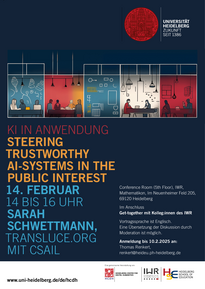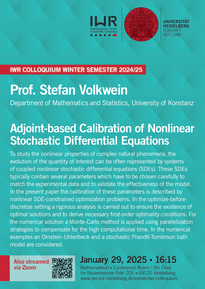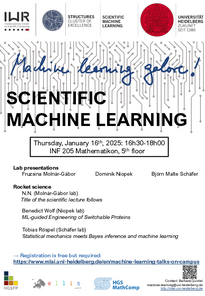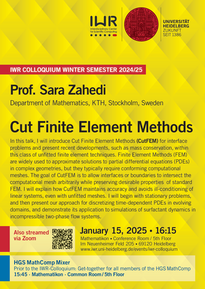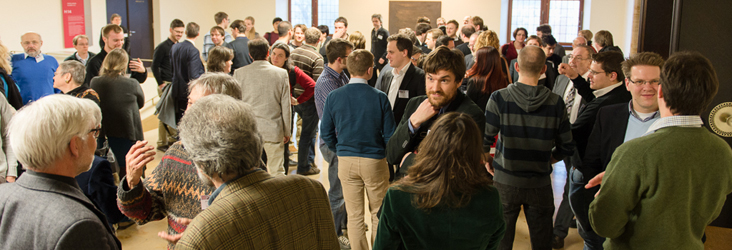
Events
The Interdisciplinary Center for Scientific Computing (IWR) and its affiliated institutions organize a large number of workshops, conferences and other events for discussing latest scientific results as well as identifing upcoming challenges in the field of Scientific Computing. In addition the IWR regularly hosts events which emphasis on broadening and improving the interdisciplinary dialogue.
2025
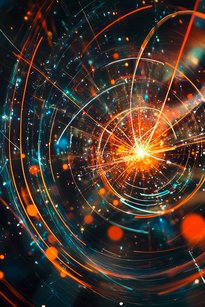
IWR School 2025
"Machine Learning for Fundamental Physics"
September 15-19, 2025
Machine Learning is here to stay and is shaping the future of fundamental physics research. From optimal inference, over theory-inspired network architectures, to anomaly detection, representation learning and foundation models, a new generation of scientists is driving these exciting developments. This school aims to further strengthen technical expertise and foster new connections.
The 2025 IWR School on Machine Learning for Fundamental Physics is aimed at advanced PhD students specializing in scientific machine learning. We particularly encourage registrations from researchers with experience in scientific machine learning, as demonstrated by papers or preprints related to the topic of the school. The school takes place at the Interdisciplinary Center for Scientific Computing (IWR) at Heidelberg University September 15-19, 2025.
Target Audience
Advanced PhD students specializing in scientific machine learning
Topics
- Modern network architectures
- Precision and uncertainties
- Scientific foundation models
- Generative Networks
- Representation learning
- Optimal inference
- Quantum field theory and networks
Scientific Organizers: Tilman Plehn, David Shih, Caroline Heneka
Location: Mathematikon • Im Neuenheimer Feld 205 • 69120 Heidelberg, Germany
For more information and how to apply online please visit the website of the IWR School 2025.
"1st Heidelberg-Chile Workshop on Scientific Computing"
March 25-28, 2025 • Heidelberg Center Latin America, Providencia, Santiago de Chile
By scientifically tackling current topics in the field of Scientific Computing, this 1st Heidelberg-Chile Scientific Workshop aims at triggering scientific networking and collaboration, with a view to defining joint research projects among participating researchers, groups and insitutions.
The initiative is rooted in the background of Heidelberg University’s longstanding presence in Chile via its off-shore campus, the Heidelberg Center Latin America, as well as its strategic partnerships with Chilean Universities.
Research Topics
- Numerical Analysis
- Optimization
- Computational Biology
- Machine Learning
89. Heidelberger Bildverarbeitungsforum
"3-D Imaging"
11. März 2025 • Hochschule Darmstadt
Dreidimensionale Bildgewinnung ist inzwischen in der Praxis angekommen und dennoch ist es äußerst schwierig, sich in der verwirrenden Vielfalt zurechtzufinden. Daher hat sich das 89. Heidelberger Bildverarbeitungsforum zum Ziel gesetzt, Möglichkeiten und Grenzen der verschiedenen 3D-Verfahren vergleichend darzustellen und mit Anwendungsbeispielen zu illustrieren.
Es werden Fragen beantwortet wie:
- Was sind die grundlegenden Prinzipien der verschiedenen Verfahren?
- Welche können nur Tiefenkarten aufnehmen und welche volumetrische Bilder?
- Welche Genauigkeiten sind zu erreichen?
- Können KI-Methoden 3D-Verfahren entscheidend verbessern?
Für das Schwerpunktthema 3-D Imaging konnte die Hochschule Darmstadt zusammen mit Vitronic Machine Vision als kompetenter und lokaler Gastgeber gewonnen werden.
Die in der Mittags- und Kaffeepause stattfindende begleitende Ausstellung zu dem Thema bietet weitere vielfältige Informations- und Gesprächsmöglichkeiten.
Anmeldung und weiterführende Informationen finden sich auf der Webseite der Veranstaltung:
https://www.bv-forum.de/89-bildverarbeitungsforum.html
"KI in Anwendung - "Steering Trustworthy AI-Systems in the Public Interest""
mit einem Impuls-Vortrag von Sarah Schwettmann • Transluce.org & MIT Computer Science and Artificial Intelligence Laboratory (CSAIL)
14. Februar 2025 • 14:00 - 16:00
Thema:
Bedenken bezüglich der Vertrauenswürdigkeit und Transparenz großer KI-Modelle sind aktueller denn je. Lassen sich große Sprachmodelle nachvollziehbar verstehen und transparent steuern? Der Vortrag bietet spannende Einblicke in die Frontforschung zu KI sowie deren ethische, politische und praktische Herausforderungen.
Sprache:
Englisch (Übersetzung der Diskussion durch Moderation möglich)
Anmeldung:
Bis inkl. 10.02.2025 per E-Mail an Thomas Renkert (renkert@heideu.ph-heidelberg.de)
Im Anschluss:
Get-Together mit Kolleg*innen des IWR
Ort: Mathematikon • Konferenzraum (5. Stock) • Im Neuenheimer Feld 205, 69120 Heidelberg
IWR Colloquium Winter Semester 2024 / 2025
"Adjoint-based calibration of nonlinear stochastic differential equations"
Prof. Stefan Volkwein • Department of Mathematics and Statistics, University of Konstanz
January 29, 2025 • 16:15
To study the nonlinear properties of complex natural phenomena, the evolution of the quantity of interest can be often represented by systems of coupled nonlinear stochastic differential equations (SDEs). These SDEs typically contain several parameters which have to be chosen carefully to match the experimental data and to validate the effectiveness of the model. In the present paper the calibration of these parameters is described by nonlinear SDE-constrained optimization problems. In the optimize-before-discretize setting a rigorous analysis is carried out to ensure the existence of optimal solutions and to derive necessary first-order optimality conditions. For the numerical solution a Monte-Carlo method is applied using parallelization strategies to compensate for the high computational time. In the numerical examples an Ornstein-Uhlenbeck and a stochastic Prandtl-Tomlinson bath model are considered.
This is a joint work with Jan Bartsch and Robert Denk. The associated paper will appear in the Journal Applied Mathematics & Optimization.
The IWR Colloquium will be held as an in-person event at the Mathematikon. In addition it will be streamed via Zoom. For more information please visit the website of the colloquium.
Location: Mathematikon • Conference Room, Room 5/104, 5th Floor • Im Neuenheimer Feld 205 • 69120 Heidelberg
"Machine learning galore!"
January 16, 2025 • 16:30 - 18:00
Machine learning galore will feature lab presentations by PIs as well as scientific talks by junior scientists.
- Lab presentations:
- Fruzsina Molnár-Gábor, Dominik Niopek, Björn Malte Schäfer
- Science talks:
- N.N. (Molnár-Gábor lab): Title of the scientific lecture follows
- Benedict Wolf (Niopek lab): ML-guided Engineering of Switchable Proteins
- Tobias Röspel (Schäfer lab): Statistical mechanics meets Bayes inference and machine learning
To help plan the catering, please register for free by clicking here. (Deadline: January 13, 2025)
Scientific Machine Learning is a joint initiative from STRUCTURES and IWR aimed at fostering interactions within and development of the local machine learning community. Its portal, http://mlai.uni-heidelberg.de summarizes the many relevant events and news from across campus that would otherwise remain scattered across single institutions or fields.
The goals of the MLAI platform align with the STRUCTURES Cluster of Excellence's objective of driving research into the fundamental understanding of current and future machine learning, and with IWR’s aim to leverage machine learning to enable the solution of long-standing problems in the natural and life sciences, the engineering sciences, as well as the humanities.
Further information and links:
- MLAI homepage
- Machine Learning Talks on Campus – Information service and mailing list
- STRUCTURES Cluster of Excellence
Location: Mathematikon • Conference Room, Room 5/104, 5th Floor • Im Neuenheimer Feld 205 • 69120 Heidelberg
IWR Colloquium Winter Semester 2024 / 2025
"Cut Finite Element Methods (CutFEM)"
Prof. Sara Zahedi • Department of Mathematics, KTH, Stockholm, Sweden
January 15, 2025 • 16:15
In this talk, I will introduce Cut Finite Element Methods (CutFEM) for interface problems and present recent developments, such as mass conservation, within this class of unfitted finite element techniques. Finite Element Methods (FEM) are widely used to approximate solutions to partial differential equations (PDEs) in complex geometries, but they typically require conforming computational meshes. The goal of CutFEM is to allow interfaces or boundaries to intersect the computational mesh arbitrarily while preserving desirable properties of standard FEM. I will explain how CutFEM maintains accuracy and avoids ill-conditioning of linear systems, even with unfitted meshes. I will begin with stationary problems, and then present our approach for discretizing time-dependent PDEs in evolving domains, and demonstrate its application to simulations of surfactant dynamics in incompressible two-phase flow systems.
The IWR Colloquium will be held as an in-person event at the Mathematikon. In addition it will be streamed via Zoom. For more information please visit the website of the colloquium.
Location: Mathematikon • Conference Room, Room 5/104, 5th Floor • Im Neuenheimer Feld 205 • 69120 Heidelberg
